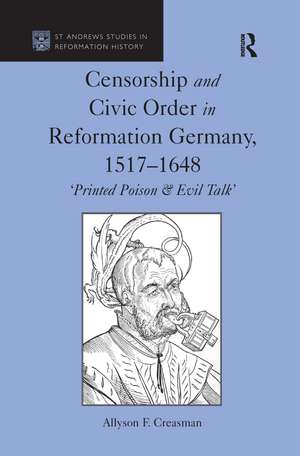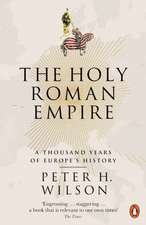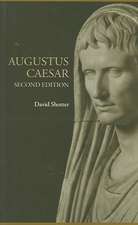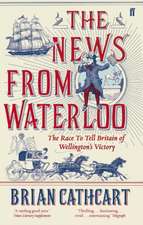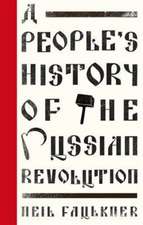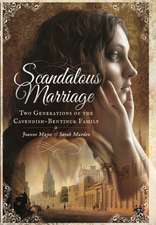Censorship and Civic Order in Reformation Germany, 1517-1648: 'Printed Poison & Evil Talk'
Autor Allyson F. Creasmanen Limba Engleză Paperback – 25 mai 2017
| Toate formatele și edițiile | Preț | Express |
|---|---|---|
| Paperback (1) | 469.34 lei 6-8 săpt. | |
| Taylor & Francis – 25 mai 2017 | 469.34 lei 6-8 săpt. | |
| Hardback (1) | 1054.71 lei 6-8 săpt. | |
| Taylor & Francis – 13 sep 2012 | 1054.71 lei 6-8 săpt. |
Preț: 469.34 lei
Nou
Puncte Express: 704
Preț estimativ în valută:
89.82€ • 93.65$ • 74.65£
89.82€ • 93.65$ • 74.65£
Carte tipărită la comandă
Livrare economică 20 martie-03 aprilie
Preluare comenzi: 021 569.72.76
Specificații
ISBN-13: 9781138109018
ISBN-10: 1138109010
Pagini: 304
Dimensiuni: 156 x 234 x 16 mm
Greutate: 0.45 kg
Ediția:1
Editura: Taylor & Francis
Colecția Routledge
Locul publicării:Oxford, United Kingdom
ISBN-10: 1138109010
Pagini: 304
Dimensiuni: 156 x 234 x 16 mm
Greutate: 0.45 kg
Ediția:1
Editura: Taylor & Francis
Colecția Routledge
Locul publicării:Oxford, United Kingdom
Notă biografică
Allyson F. Creasman, Carnegie Mellon University, USA.
Recenzii
'Skillfully reconstructed from a plethora of archival case studies, this fresh take on urban discursive culture not only explains the vagaries of formal censorship law as an intentional and necessary mechanism for preserving civic order ... but also successfully demonstrates that the workings of early modern censorship relied upon a decidedly pre-modern expectation, namely, that all urban dwellers, whether elite or common, clerical or lay, should shape their actions and opinions in the interest of preserving the urban community. ... All are likely to find Creasman's approach highly stimulating for their own research.' Lutheran Quarterly 'Apart from the book’s refreshing sensitivity to negotiation and cooperation as keys to enforcing censorship policies, Creasman’s other main contribution consists in an extended definition of censorship. This study includes an assessment not only of print culture, but also takes into account how oral culture fitted into early modern efforts to regulate expression. The book’s attention on oral violations of censorship law makes an important impression on the book’s overall thesis... This book has much to recommend it.' German History 'Creasman’s book succeeds in giving Reformation studies a much-needed account of censorship in the German cities. Typical of Ashgate’s volumes in its St Andrews Studies in Reformation History series, Censorship and Civic Order in Reformation Germany is well researched and replete with fascinating details.' Sixteenth Century Journal 'Creasman has some important things to say about the flow of ideas in the German Reformation. By adopting a notion of censorship that projects it as a dynamic force in dialogue rather than just a normative measure impressed from above, we get a sense of how it served as both a forum for negotiating competing demands and a vehicle for creating and enforcing new concepts of civic order. Historians who speak of civic reformation settlements or the rise o
Cuprins
Introduction; Chapter 1: “Words, Works, or Writings:” Communication and the Law of Censorship; Chapter 2: Policing the Word: Censorship and Reformation; Chapter 3: Keeping the Peace: Censorship and Confessional Relations under the Peace of Augsburg; Chapter 4: “A Fire Started:” Sedition, Censorship, and the Calendar Conflict; Chapter 5: “The Times, They are so Troubled:” Censorship in Wartime, 1618–1648; Conclusion
Descriere
Drawing upon criminal court records, trial manuscripts and contemporary journals this book explores the impact of censorship on religious reform in German cities during the Reformation. The study argues that censorship, whilst routinely compromised and often circumvented, nonetheless profoundly influenced how communities understood the Reformation and its message.
